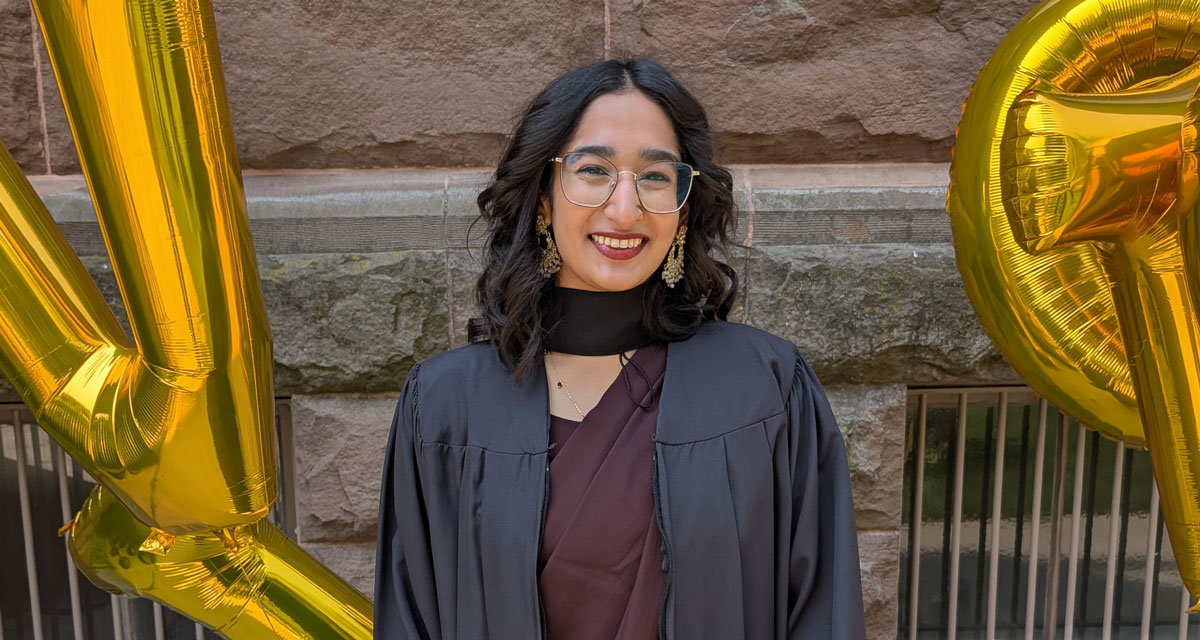Vic’s Laila Vahed Blends History and Advocacy on Path to Yale

By Cynthia Macdonald - A&S News
Anyone wanting to write down the list of Laila Vahed’s activities over the last four years is advised to bring more than one pen. There’s filmmaking, social advocacy, health research, sports, arts administration and student governance — just for starters.
Not to mention that she’s an aspiring historian preparing to embark on a master’s degree at Yale University in the fall. As Vahed graduates this convocation season as a member of Victoria College, she says: “I did a lot. And still, I wish I did even more!”
Given that you have so many interests, it would be fascinating to know what you studied at U of T.
I studied a major in history and a double minor: diaspora and transnational studies, and sexual diversity studies. Studying history has prepared me to take a very interdisciplinary approach to university—I found I could weave in different parts of my diaspora and sexuality studies into my history work. It allowed me to write creatively and historically, connecting with scholars who came before me. I really felt part of that lineage.
What sparked your interest in history?
I took a class in first year with Professor Heidi Bohaker on the history of residential schools; she did an excellent job, bringing in an Indigenous elder to speak and making the study of history really interactive. From then on, many professors were fundamental in shaping my critical approach to history: Professor Melanie Newton, Professor Nakanyike Musisi, Professor Naveen Minai, and more. Studying history, I got the chance to do so much: I wrote about student revolution during apartheid in South Africa; women’s poetry in the Iranian revolution; the psychological impacts of the Algerian revolution. I was able to explore all these things and more, through a very interdisciplinary and intersectional lens.
I feel like history lends itself to every part of my world — to politics, to friendships, to how I can understand and engage with people who’ve migrated to Canada. It allows me to connect with my peers more sincerely, because learning someone’s heritage is important for knowing them. History and advocacy are deeply related. Having a history degree has prepared me to walk through life with care and compassion: it really reinforces that bond of community for me.
You’ve done a lot of charitable work on behalf of the Muslim community, especially working with Muslims in marginalized spaces.
I’ve been doing this work since before university, but it has flourished since then. It has allowed me to connect with people who have shared values with me, who see the world in the same way, and who have experienced similar subjugations. More so, they are people who have used their life experiences and stories of migration and strife to position their advocacy and create belonging in our community.
The Muslim part is integral, because this intersection really is a space where I feel completely at peace. These are people who share in the beliefs and the practices that I do. And together, we’ve created this very safe, embracing community. We put on programming that’s both religious and social. It’s very big on charity and giving, and very big on feeding our community. It’s one of the most rewarding parts of my life.
Everyone’s heard of TIFF, but now we also have MIFF — the Muslim International Film Festival. I understand you’ve done a lot of great work with them, while starting your own career as a filmmaker.
I was so lucky to get this job; I was only in first year when I applied! I worked there for two years, in marketing and then events. Film has been such a beautiful space that’s allowed me to combine my love for archival work and my creative spirit. And this particular festival allows you to watch films from Pakistan, Sudan, Egypt, Turkey, Iraq, and many other countries, and experience the many themes and histories that are shared around the world.
I went on to direct my own short film last summer through the Mississauga Multilingual Fringe Festival, and it was a great experience. It was called Method to the Madness, and much like my other work, was a collaboration with friends. Within the span of a month, we had to prep it, shoot it, edit it and send it out. After I finish my master’s, I hope to get back into film.
You did so much more, too: health research on a project at the Dalla Lana School of Public Health; intramural soccer at Vic; work with the Diaspora and Transnational Studies Union. How did you fit it all in?
I felt very social coming into university, because the pandemic had just ended. I was yearning for human connection. With each new semester, I felt like I was discovering a new part of myself. I feel so proud that my capacity for stress, for hard work, for juggling a bunch of anxiety-inducing tasks is so much higher than it was when I started undergrad.
What’s next?
This fall I’ll be going to Yale University to pursue a master’s degree in history, with a focus on histories of revolution and anti-colonialism. Afterwards, I’m hoping to pursue a PhD and return to university as a professor.
(This article is courtesy of the University of Toronto Faculty of Arts & Science News.)
